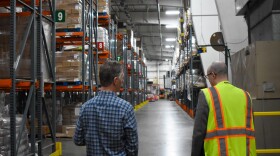-
Ahead of the Thanksgiving holiday, KCUR's Up To Date broadcasted from Harvesters Community Food Network in Kansas City to hear how the organization is managing a time of extremely high demand.
-
About 1 in 8 U.S. residents get an average of $187 a month per person in the food assistance known as SNAP. For the first time, the Trump administration stopped the payments due at the beginning of the month.
-
The Trump administration in late March slashed $500 million that had already been allocated to food aid nationwide through the Emergency Food Assistance Program. That canceled 124 scheduled deliveries to Missouri food banks.
-
Changes to federal food assistance could cause thousands of Kansans to lose some or all of their benefits. The consequences for low-income families will depend now, more than ever, on state lawmakers. Plus: When you're shopping the produce section of a grocery store, you probably want to buy local — but that food probably traveled a long way to get there.
-
State lawmakers must soon decide whether to cover the extra costs to provide food assistance. If they don’t, food banks and pantries alone can’t make up the difference.
-
Cuts to federal food aid have already reduced the food available at area food pantries and meal sites. If SNAP gets hit too, nonprofits worry they won’t be able to keep up with demand.
-
Summer break can be difficult for students who rely on schools for free meals, mental health services and other support. Kansas City area schools are trying to bridge that gap.
-
Harvesters, the food bank that serves the Kansas City area and helps supply food to local pantries and shelters, says that thousands of cases of canned food, eggs, milk and more were called off by President Trump's U.S. Department of Agriculture.
-
Wagers, contests, and collaborations between the City of Brotherly Love and the City of Fountains are blowing up the internet once again. Museums, zoos, restaurants, libraries, animal shelters, and more in Kansas City are all betting on the home team — and hoping for a “three-peat.”
-
Kansas City nonprofits need to feed more hungry people with less funding. Here's what they're tryingKansas City community kitchens are seeing higher demand as food prices remain high and COVID-19 assistance disappears. The food bank Harvesters is focusing on rescuing food waste as one way to shore up its supplies as demand rises, and donations are down.
-
The holiday break can be difficult for families who rely on schools to provide meals, shelter and other resources to their kids. Schools around the Kansas City area started planning early so kids would be taken care of.
-
Mayors, senators, hospitals, zoos — everyone’s getting into the mix, with cheesesteaks, barbecue, and Poor Richard’s Almanack at stake.
Play Live Radio
Next Up:
0:00
0:00
Available On Air Stations












